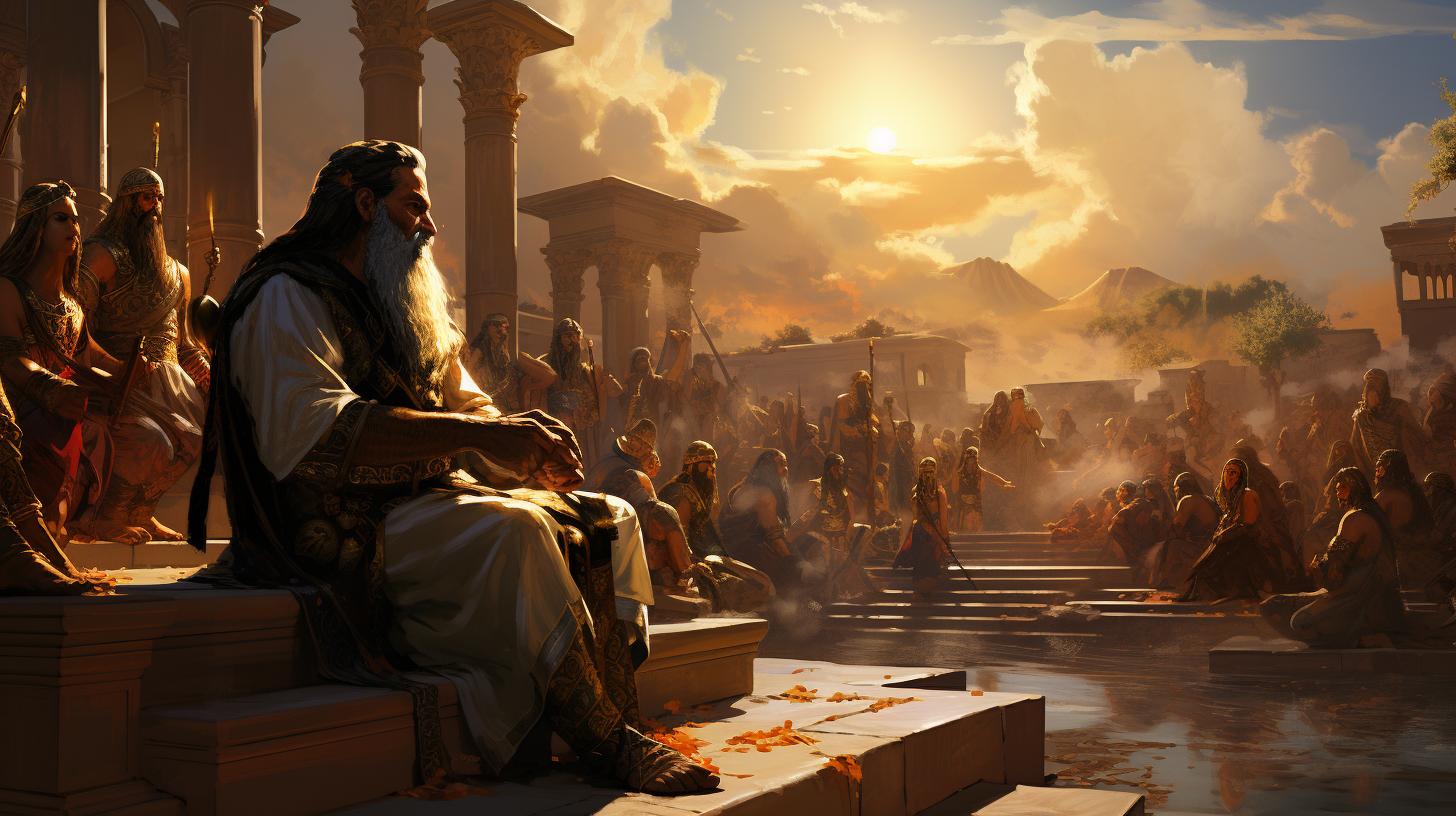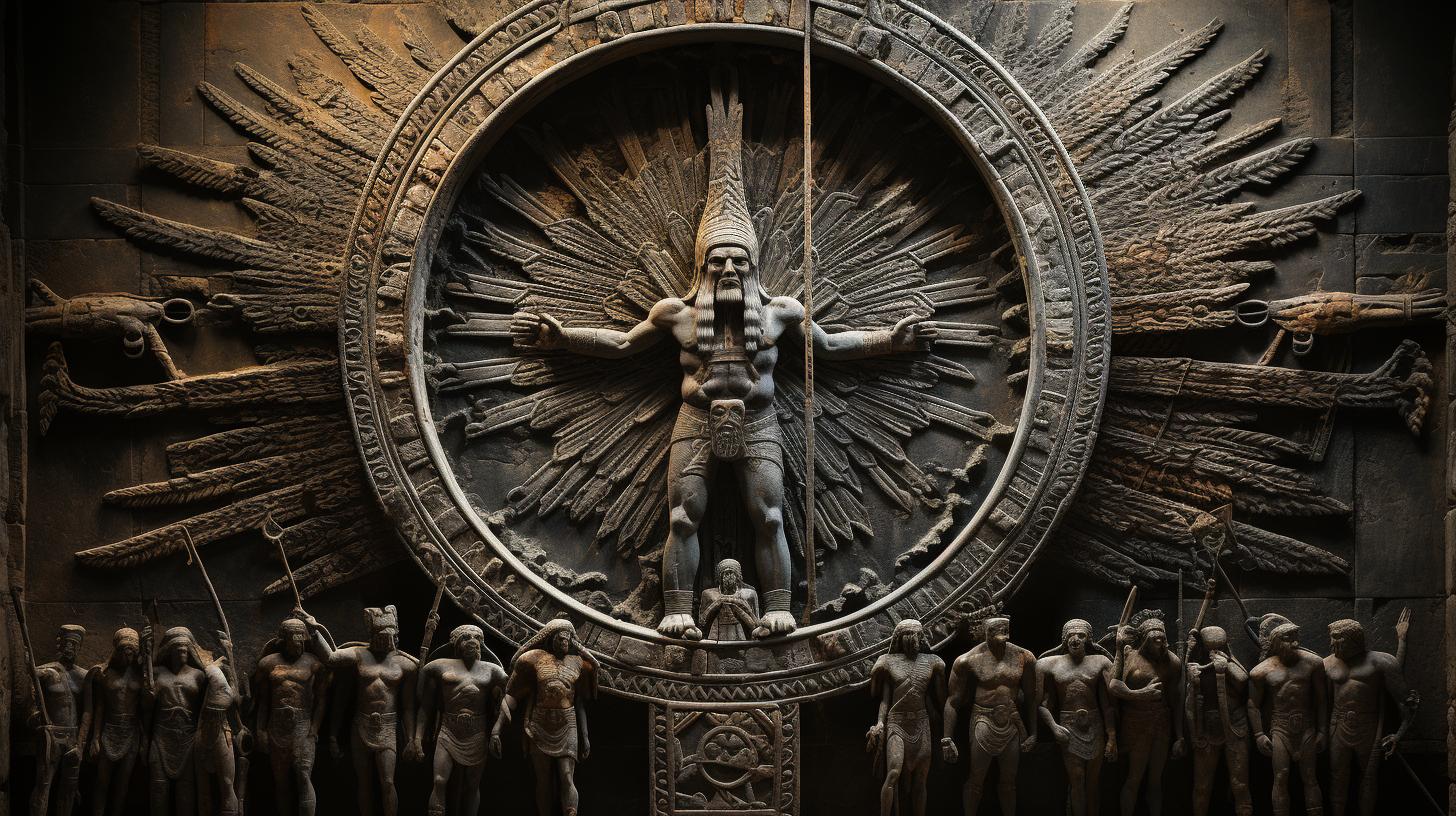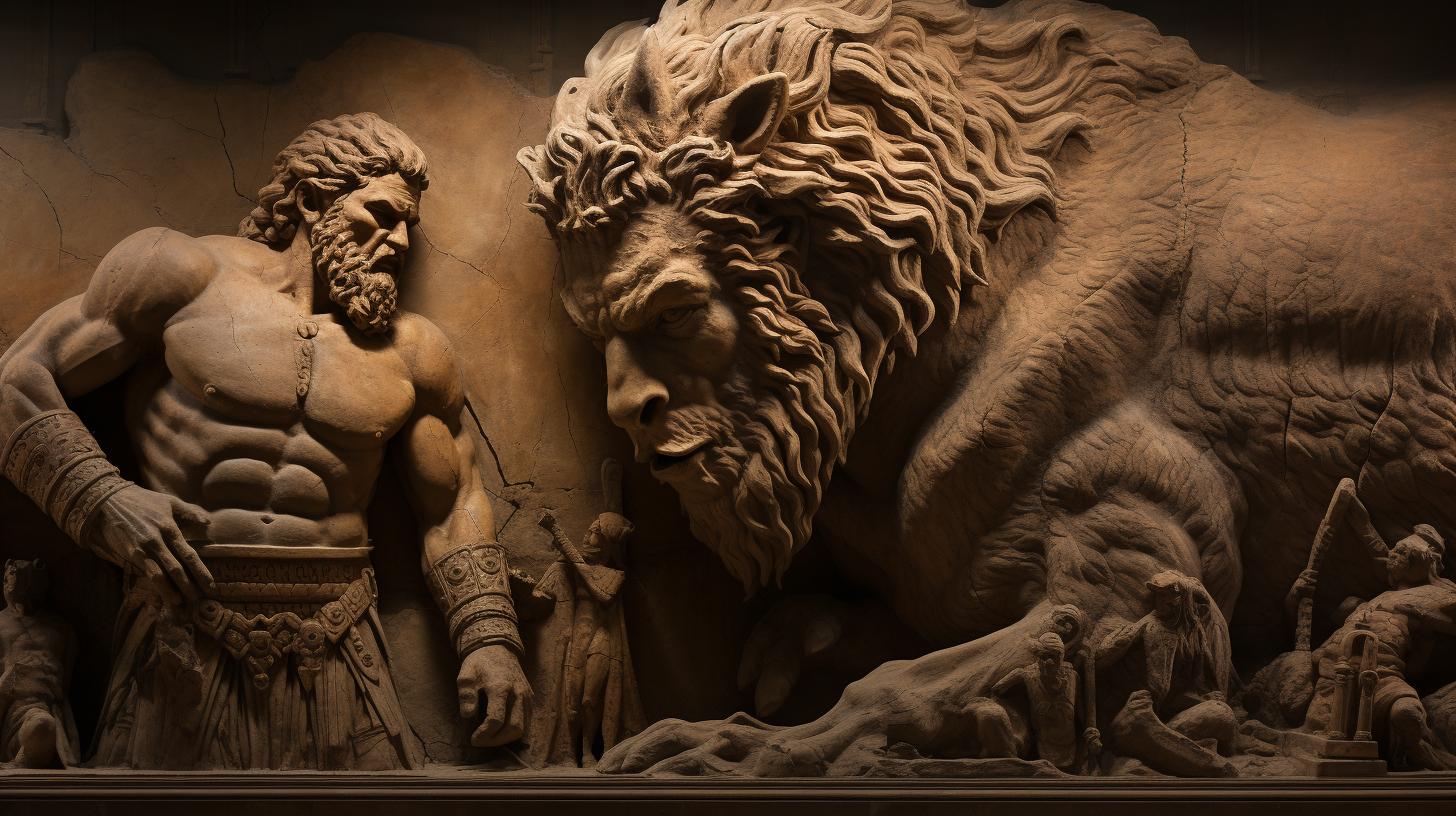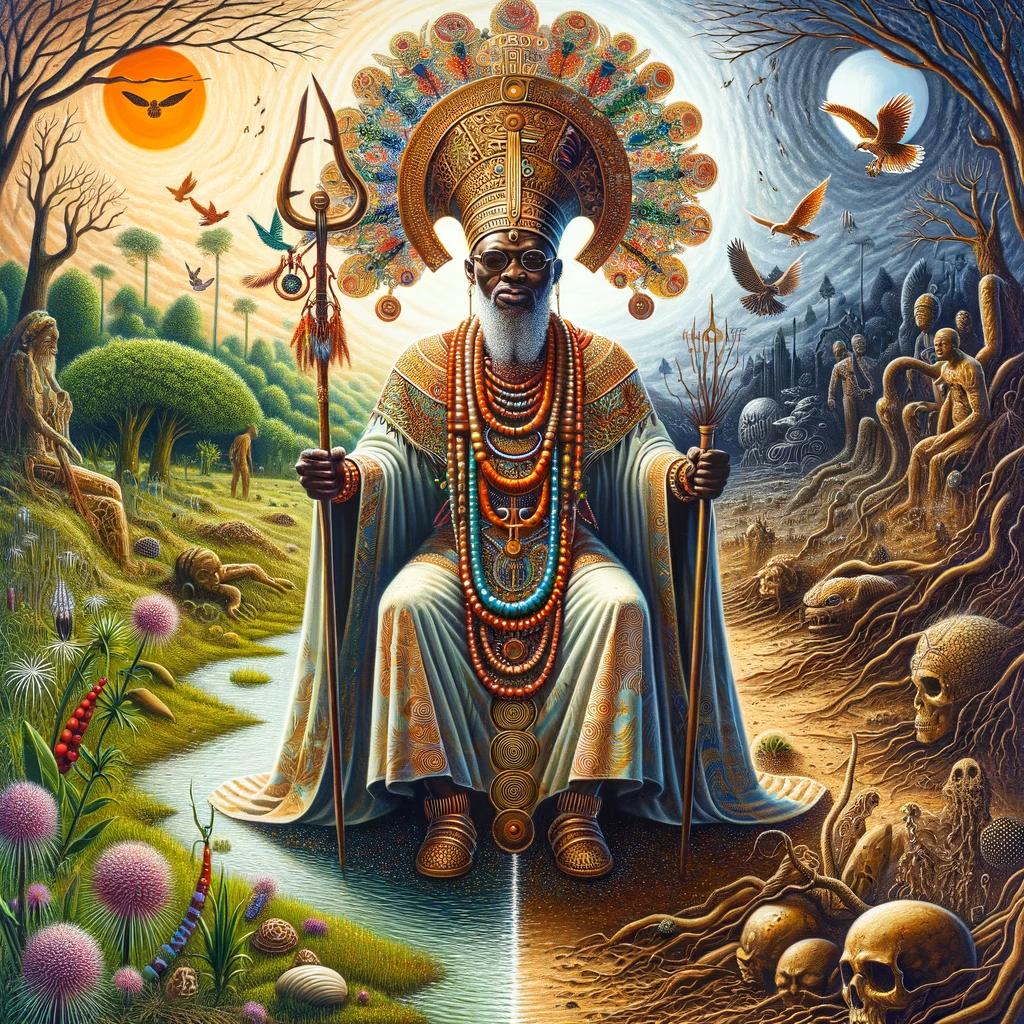The Myth of Adapa: Exploring the Ancient Mesopotamian Tale

The myth of Adapa is a legendary story from ancient Mesopotamian mythology that explains the concept of mortality in humans. Adapa, a wise citizen of Eridu, was bestowed with great intelligence by the god Ea. One day, a powerful south wind caused Adapa to break its wings, resulting in the wind no longer blowing.
This angered Anu, the god of the sky, who summoned Adapa to answer for his actions. However, with Ea’s warning, Adapa made a wise decision. He rejected the offer of eternal life from Anu, and thus, humanity remained mortal.
The myth of Adapa has significant cultural and religious implications in ancient Mesopotamia. It raises questions about the nature of wisdom, mortality, and divine intervention.
The Ancient Mesopotamian Mythology
The ancient Mesopotamian mythology holds a significant place in the cultural and religious beliefs of the region. It encompasses a rich collection of myths, legends, and stories that were passed down through generations, offering insights into the cosmological and divine aspects of the Mesopotamian civilization.
Origins and Importance of Mythology in Mesopotamia
The origins of Mesopotamian mythology can be traced back to the Sumerians, who developed one of the world’s earliest known written languages, cuneiform. With the rise of city-states in Mesopotamia, mythology became an integral part of their religious and cultural practices, serving as a way of explaining the natural world, human existence, and the interaction between gods and mortals.
Overview of the Myth of Adapa
Among the many captivating myths of Mesopotamia, the myth of Adapa stands out as a legendary tale that sheds light on the mortal nature of human beings. Adapa, a wise citizen of Eridu, was bestowed with exceptional intelligence by the god Ea. His encounter with the powerful south wind and subsequent confrontation with the sky god Anu form the central narrative of this myth.
Adapa: The Wise Citizen of Eridu
Adapa, a prominent figure in the myth of Adapa, is portrayed as a wise citizen hailing from the city of Eridu. Esteemed for his intelligence and knowledge, Adapa became the recipient of divine wisdom bestowed upon him by the god Ea. This bestowed intelligence set Adapa apart from his peers, giving him a unique understanding of the world and its workings.
Adapa’s Intelligence Bestowed by the God Ea
Adapa’s exceptional wisdom was a direct result of the god Ea’s generosity. As the god of wisdom, Ea recognized Adapa’s potential and chose to bless him with remarkable intelligence.
This divine gift enabled Adapa to navigate various intellectual pursuits and acquire extensive knowledge in diverse areas, making him a respected and revered figure in Eridu.
Adapa’s Encounter with the South Wind
One fateful day, while Adapa was engrossed in fishing, he found himself facing a great turmoil due to the powerful south wind. The wind’s intensity propelled him into the sea, causing Adapa to become overwhelmed with anger.
In his fury, Adapa broke the wings of the south wind, rendering it motionless and ceasing its forceful movements.
This act caught the attention of Anu, the sky god, who summoned Adapa to answer for his actions. However, Ea, cognizant of the potential consequences, warned Adapa not to consume the pantheon’s offered bread and water while in the celestial realm.
Continued below…
- Tammuz and Ningishzida: The Celestial Defenders
- Adapa Summoned to Account for His Actions
Confrontation with Anu: The God of the Sky
Adapa Summoned to Account for His Actions
In this crucial part of the myth, Adapa’s encounter with the powerful south wind leads to dire consequences. The wind throws him into the sea and, in his fury, he breaks its wings.
However, unbeknownst to him, this act angers Anu, the god of the sky, who demands an explanation from Adapa.
Ea’s Warning and Adapa’s Wise Decision
Ea, the god who bestowed intelligence upon Adapa, forewarns him about the consequences of accepting the pan and water that would grant eternal life in the celestial realm.
Adapa heeds Ea’s advice and refrains from consuming them, ultimately displaying his wisdom and prudence in the face of temptation.
As Adapa stands before Anu, his decision to reject immortality intrigues the sky god.
Anu questions why Ea, known for his wisdom, denied Adapa eternal life. The dialogue between Anu and Adapa raises profound questions about mortality and the limitations placed on humanity.
Adapa Summoned to Account for His Actions
In this section, the confrontation between Adapa and Anu is explored. Adapa’s unintentional act of breaking the wings of the south wind leads to Anu’s wrath and his summons to explain his actions.
Ea’s Warning and Adapa’s Wise Decision
This subsection highlights the significance of Ea’s warning to Adapa, advising him to decline the offer of immortality. Adapa’s wise decision to follow Ea’s counsel not only reflects his intelligence but also raises questions about the role of divine intervention in mortal existence.
Tammuz and Ningishzida: The Celestial Defenders
Before Anu could pronounce a judgment, celestial defenders Tammuz and Ningishzida stepped forward, interceding on behalf of Adapa. Their intervention aimed to shed light on the fact that Adapa only needed immortality to ascend to the status of a god.
Tammuz, known as the shepherd god, and Ningishzida, associated with healing and the underworld, pleaded for Adapa’s case before the divine court.
The Intervention of Tammuz and Ningishzida
Tammuz and Ningishzida, faithful and devoted to their duties as celestial defenders, emphasized Adapa’s wisdom and the value he brought to humanity. They highlighted how his intelligence, bestowed by Ea, made him worthy of divine recognition.
Through their intervention, they emphasized the need for Adapa to be granted immortality, which would perpetuate his legacy and transcend mortal limitations.
Their Plea for Adapa’s Immortality
Continuing their argument, Tammuz and Ningishzida appealed to Anu’s sense of divine justice. They believed that granting Adapa immortality would be a fair outcome, aligning with his wisdom and the broader purpose of human existence.
Recognizing the potential for enlightenment and guidance Adapa could provide, they implored Anu to reconsider his initial anger and grant Adapa the divine privilege of immortality.
- Tammuz and Ningishzida’s Intervention emphasized Adapa’s intelligence and value to humanity.
- They believed immortality was crucial for Adapa’s transcendence and fulfillment of his potential.
- Their plea appealed to Anu’s sense of justice and the overall purpose of human existence.
By interceding on Adapa’s behalf, Tammuz and Ningishzida presented a compelling case for the celestial court to reconsider their initial judgment.
Their arguments pivoted on the recognition of Adapa’s wisdom and the potential impact his immortality would have on humanity.
Anu’s Offer and Adapa’s Rejection
After Adapa’s summoning by Anu, the god of the sky, a momentous exchange took place that would shape the fate of humanity. This section explores two crucial aspects of this encounter: An alternate interpretation suggesting Ea’s deception and Anu’s respect for Adapa’s choice and his subsequent curiosity.
An Alternate Interpretation: Ea’s Deception
Some scholars propose an alternative reading of the events, pointing towards Ea’s deceptive actions. According to this interpretation, Ea intentionally misled Adapa to prevent humans from gaining immortality, fearing the potential consequences.
However, Anu’s response to this theory raises intriguing questions about why Ea denied Adapa the gift of immortality, considering his wisdom and importance to humanity.
Anu’s Respect for Adapa’s Choice and his Curiosity
Despite the alternate interpretation, Anu displayed a sense of respect for Adapa’s decision.
He acknowledged Adapa’s wisdom and considered why Ea would prevent him from attaining immortality. This demonstrates Anu’s curiosity and his recognition of the significance of human agency in shaping their own destiny.
Whether one adheres to the notion of Ea’s deception or recognizes Anu’s respect for Adapa’s choice, this crucial moment in the myth highlights the complexities of divine intervention and human autonomy.
The consequences of Adapa’s rejection shaped the mortal nature of humanity, leading to further exploration of mortality’s meaning and humanity’s place in the cosmos.
The Significance of Adapa’s Myth
The myth of Adapa holds significant cultural and religious importance in ancient Mesopotamian civilization. It offers insights into the origin of mortality and raises philosophical questions about the human condition.
Explaining Mortality: The Consequences for Humanity
The myth of Adapa provides an explanation for why humans are mortal.
Adapa’s encounter with the South Wind and his subsequent actions in angering the god Anu resulted in his missed opportunity for eternal life. This tale serves as a cautionary reminder of the consequences that arise from challenging divine authority.
- Adapa’s defiance of Anu’s offer of immortality reinforces the concept of mortality as an inherent aspect of human existence.
- This myth underscores the limitations of human wisdom and the acceptance of mortality as an essential part of the natural order.
- It prompts reflection on the fragility and ephemerality of human life, urging individuals to find meaning and purpose within their limited time on Earth.
Comparisons with Other Sumerian Myths
The myth of Adapa shares similarities and themes with other Sumerian myths, shedding light on broader cultural beliefs and narratives within ancient Mesopotamia.
- In the Epic of Gilgamesh, the story of Enkidu’s mortality after defying the gods resonates with Adapa’s tale, emphasizing the inevitability of death.
- The Atrahasis myth explores the theme of mortality within the context of divine punishment for human disobedience, emphasizing the importance of divine order.
- Comparisons with these myths showcase consistent themes of mortality, divine intervention, and the human quest for immortal life.
By examining the significance of Adapa’s myth in the context of mortality and its relation to other Sumerian myths, we gain a deeper understanding of the ancient Mesopotamian worldview, their beliefs about the human condition, and the role of the divine in shaping human destiny.
Legacy and Influence of the Myth of Adapa
The myth of Adapa has had a profound impact on ancient Mesopotamian culture and religion, shaping their beliefs and practices. This unique tale reflects the Mesopotamians’ understanding of mortality and the relationship between gods and humans.
It has been preserved through generations and has left lasting impressions on various aspects of Mesopotamian society.
Impact on Ancient Mesopotamian Culture and Religion
The myth of Adapa held significant religious and cultural importance in ancient Mesopotamia. It contributed to the understanding of mortality among the people, explaining why humans are not blessed with eternal life like the gods.
This concept of mortality played a pivotal role in shaping their philosophy and worldview.
The story also highlights the complex relationship between humans and deities. Adapa, as a mortal granted intelligence by the god Ea, represents the connection between the divine and the human realms.
His encounter with Anu, the god of the sky, and the subsequent rejection of immortality reveal the Mesopotamians’ belief in divine authority and human agency.
Moreover, the intervention of Tammuz and Ningishzida, the celestial defenders, adds another layer of religious significance.
Their plea for Adapa’s immortality showcases the Mesopotamian belief in divine intermediaries and their involvement in human affairs.
Relevance and Interpretations in the 21st Century
The myth of Adapa continues to hold relevance in the 21st century, resonating with scholars and enthusiasts interested in ancient Mesopotamian culture and mythology. Its influence can be observed in various fields, including literature, history, and religious studies.
Academic research and interpretation of the myth contribute to a better understanding of the ancient Mesopotamian mindset and their worldview. It provides valuable insights into their perception of mortality, divine-human relationships, and the role of wisdom in their society.
Additionally, the myth of Adapa serves as a reminder of the enduring power of ancient narratives and their ability to transcend time and cultures. It invites us to ponder universal questions surrounding mortality, wisdom, and the choices we make.
- The myth of Adapa sheds light on the complexities of ancient Mesopotamian culture and their belief systems.
- It explains the concept of mortality among humans and the relationship between gods and mortals.
- The story showcases the significance of divine intermediaries and their role in human affairs.
- It remains relevant in the 21st century, contributing to academic research and our understanding of ancient civilizations.
- The myth invites contemplation on universal themes such as mortality, wisdom, and the consequences of our choices.
.




















